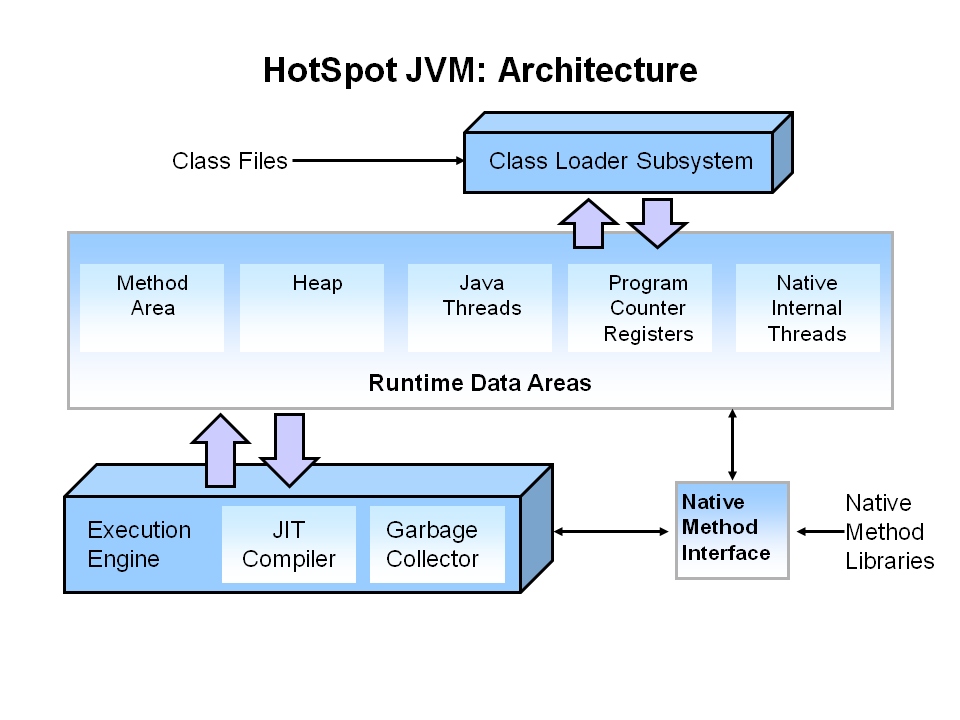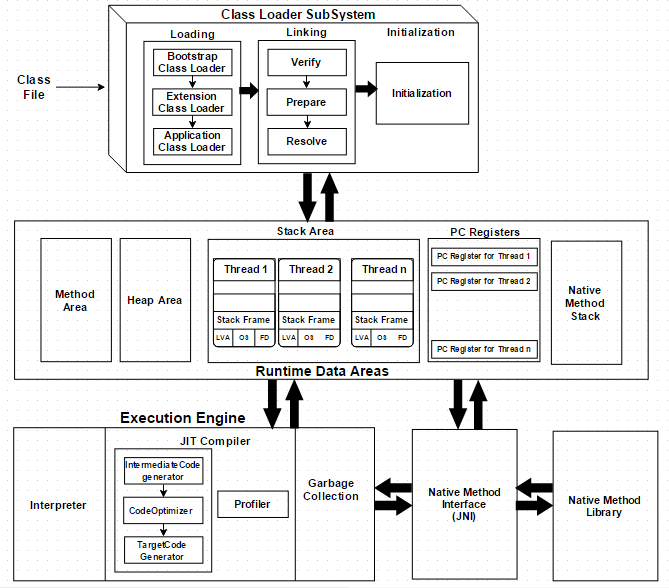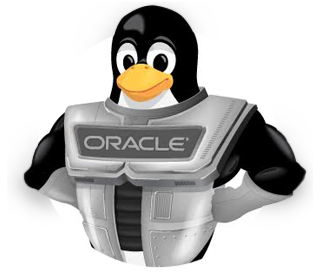JVM架构图
更多关于JVM的架构,请参考官方文档
https://docs.oracle.com/javase/specs/jvms/se13/html/jvms-2.html
Java SE HotSpot一瞥,里面有很多官方关于JVM的文档
https://www.oracle.com/technetwork/java/javase/tech/index-jsp-136373.html

https://dzone.com/articles/jvm-architecture-explained

OpenJDK JVM源码
下面是openJDK源码的下载地址
OpenJDK&trade 6 Source ReleaseOctober 26, 2012(Build b27)
http://openjdk.java.net/projects/jdk6/
https://download.java.net/openjdk/jdk6/
https://download.java.net/openjdk/jdk6/promoted/b27/openjdk-6-src-b27-26_oct_2012.tar.gz
OpenJDK7
June 27, 2011(Build b147)
https://download.java.net/openjdk/jdk7/
https://download.java.net/openjdk/jdk7/promoted/b147/openjdk-7-fcs-src-b147-27_jun_2011.zip
OpenJDK8
March 10, 2014*(Build b132)
http://hg.openjdk.java.net/jdk8/jdk8
https://download.java.net/openjdk/jdk8/promoted/b132/openjdk-8-src-b132-03_mar_2014.zip
Kaffe JVM
http://www.kaffe.org/
https://github.com/kaffe/kaffe
编译模式
https://openjdk.java.net/groups/hotspot/docs/HotSpotGlossary.html
https://www.oracle.com/technical-resources/articles/java/architect-evans-pt1.html
Inside Java HotSpot VM, there are actually two separate JIT compiler modes, which are known as C1 and C2. C1 is used for applications where quick startup and rock-solid optimization are required; GUI applications are often good candidates for this compiler. C2, on the other hand, was originally intended for long-running, predominantly server-side applications. Prior to some of the later Java SE 7 releases, these two modes were available using the -client and -server switches, respectively.java -version
java version "1.8.0_231"
Java(TM) SE Runtime Environment (build 1.8.0_231-b11)
Java HotSpot(TM) 64-Bit Server VM (build 25.231-b11, mixed mode)
java、javac等源码的位置
平常我们编译java代码的命令javac,运行java应用的java命令就在下面的路径下
src\share\classes\sun\tools\javac\
src\share\classes\sun\tools\java\
JDK main函数入口
\src\share\bin\main.c
int
main(int argc, char ** argv)
{
int margc;
char** margv;
const jboolean const_javaw = JNI_FALSE;
margc = argc;
margv = argv;
#endif /* JAVAW */
return JLI_Launch(margc, margv,
sizeof(const_jargs) / sizeof(char *), const_jargs,
sizeof(const_appclasspath) / sizeof(char *), const_appclasspath,
FULL_VERSION,
DOT_VERSION,
(const_progname != NULL) ? const_progname : *margv,
(const_launcher != NULL) ? const_launcher : *margv,
(const_jargs != NULL) ? JNI_TRUE : JNI_FALSE,
const_cpwildcard, const_javaw, const_ergo_class);
}
\jdk\src\share\bin\java.c/*
* Entry point.
*/
int
JLI_Launch(int argc, char ** argv, /* main argc, argc */
int jargc, const char** jargv, /* java args */
int appclassc, const char** appclassv, /* app classpath */
const char* fullversion, /* full version defined */
const char* dotversion, /* dot version defined */
const char* pname, /* program name */
const char* lname, /* launcher name */
jboolean javaargs, /* JAVA_ARGS */
jboolean cpwildcard, /* classpath wildcard*/
jboolean javaw, /* windows-only javaw */
jint ergo /* ergonomics class policy */
)
{
int mode = LM_UNKNOWN;
char *what = NULL;
char *cpath = 0;
char *main_class = NULL;
int ret;
InvocationFunctions ifn;
jlong start, end;
char jvmpath[MAXPATHLEN];
char jrepath[MAXPATHLEN];
_fVersion = fullversion;
_dVersion = dotversion;
_launcher_name = lname;
_program_name = pname;
_is_java_args = javaargs;
_wc_enabled = cpwildcard;
_ergo_policy = ergo;
InitLauncher(javaw);
DumpState();
/*
* Make sure the specified version of the JRE is running.
*
* There are three things to note about the SelectVersion() routine:
* 1) If the version running isn't correct, this routine doesn't
* return (either the correct version has been exec'd or an error
* was issued).
* 2) Argc and Argv in this scope are *not* altered by this routine.
* It is the responsibility of subsequent code to ignore the
* arguments handled by this routine.
* 3) As a side-effect, the variable "main_class" is guaranteed to
* be set (if it should ever be set). This isn't exactly the
* poster child for structured programming, but it is a small
* price to pay for not processing a jar file operand twice.
* (Note: This side effect has been disabled. See comment on
* bugid 5030265 below.)
*/
SelectVersion(argc, argv, &main_class);
if (JLI_IsTraceLauncher()) {
int i;
printf("Command line args:\n");
for (i = 0; i < argc ; i++) {
printf("argv[%d] = %s\n", i, argv[i]);
}
AddOption("-Dsun.java.launcher.diag=true", NULL);
}
CreateExecutionEnvironment(&argc, &argv,
jrepath, sizeof(jrepath),
jvmpath, sizeof(jvmpath));
ifn.CreateJavaVM = 0;
ifn.GetDefaultJavaVMInitArgs = 0;
if (JLI_IsTraceLauncher()) {
start = CounterGet();
}
if (!LoadJavaVM(jvmpath, &ifn)) {
return(6);
}
if (JLI_IsTraceLauncher()) {
end = CounterGet();
}
JLI_TraceLauncher("%ld micro seconds to LoadJavaVM\n",
(long)(jint)Counter2Micros(end-start));
++argv;
--argc;
if (IsJavaArgs()) {
/* Preprocess wrapper arguments */
TranslateApplicationArgs(jargc, jargv, &argc, &argv);
if (!AddApplicationOptions(appclassc, appclassv)) {
return(1);
}
} else {
/* Set default CLASSPATH */
cpath = getenv("CLASSPATH");
if (cpath == NULL) {
cpath = ".";
}
SetClassPath(cpath);
}
/* Parse command line options; if the return value of
* ParseArguments is false, the program should exit.
*/
if (!ParseArguments(&argc, &argv, &mode, &what, &ret, jrepath))
{
return(ret);
}
/* Override class path if -jar flag was specified */
if (mode == LM_JAR) {
SetClassPath(what); /* Override class path */
}
/* set the -Dsun.java.command pseudo property */
SetJavaCommandLineProp(what, argc, argv);
/* Set the -Dsun.java.launcher pseudo property */
SetJavaLauncherProp();
/* set the -Dsun.java.launcher.* platform properties */
SetJavaLauncherPlatformProps();
/* Show the splash screen if needed */
ShowSplashScreen();
return ContinueInNewThread(&ifn, argc, argv, mode, what, ret);
}
下面几篇是关于JVM的文章,感觉还不错
https://www.cnblogs.com/jmcui/p/11796303.html
https://www.cnblogs.com/chanshuyi/p/jvm_serial_02_the_history_of_jvm.htmlhttps://www.waytoeasylearn.com/learn/what-is-jvm/
https://www.cubrid.org/blog/understanding-jvm-internals/
https://metebalci.com/blog/demystifying-the-jvm-interpretation-jit-and-aot-compilation/
https://www.beyondjava.net/java-programmers-guide-java-byte-code
Reference
https://www.oracle.com/webfolder/technetwork/tutorials/obe/java/gc01/index.html
https://en.wikipedia.org/wiki/Java_virtual_machine
https://jdk.java.net/https://openjdk.java.net/
https://openjdk.java.net/projects/code-tools/
https://openjdk.java.net/faq/
https://github.com/openjdk/jdk
https://github.com/javaee/javaee.github.io
https://javaee.github.io/javamail/#Samples
https://blogs.oracle.com/sundararajan/so-you-want-to-read-hotspot-source
https://blogs.oracle.com/sundararajan/helloworld-with-maxine-jvm-on-mac
https://www.artima.com/insidejvm/ed2/introarch.html
https://www.engr.colostate.edu/~sudeep/wp-content/uploads/CD2.15-P374493.pdf
https://stackoverflow.com/questions/421951/running-interpreting-c-on-top-of-the-jvm
https://stackoverflow.com/questions/2026093/is-jvm-open-source-code
https://stackoverflow.com/questions/16568253/difference-between-jvm-and-hotspot
https://www.cnblogs.com/jmcui/p/11796303.html
https://www.cnblogs.com/chanshuyi/p/jvm_serial_02_the_history_of_jvm.html

